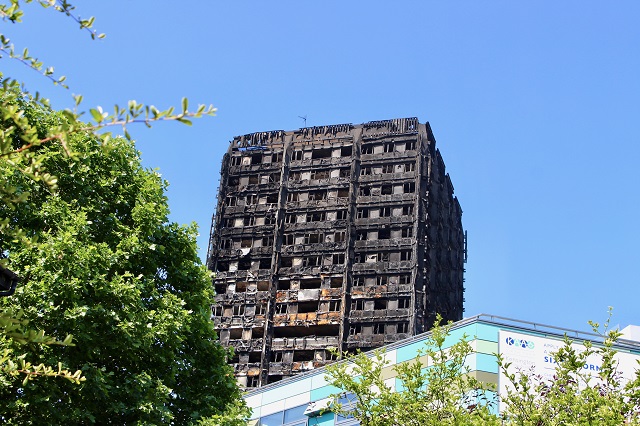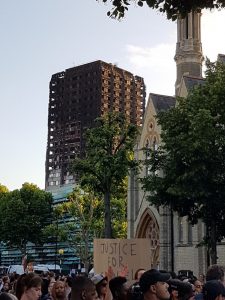‘We mean nothing to them’: Grenfell, London’s Katrina Politics
New in Ceasefire, Politics - Posted on Monday, June 19, 2017 17:15 - 0 Comments
By Musab Younis

(Photo: Pierre Papet/Ceasefire)
Grenfell is being compared to Katrina, and for good reason. In the wake of the disaster, the relief effort was abandoned to local charities—as if London were a war zone undergoing state collapse instead of one of the world’s richest cities. Mosques and churches complained about ‘non-existent’ direction from authorities.
Survivors have reported, over and over again, not knowing where they will be sleeping, being stonewalled when they try to get information, receiving no information about missing family members and friends. One man had to ‘beg and cajole’ (his words) a nurse to find the children of his relative in a hospital. ‘Police are not identifying people,’ he said.
A woman reported having to sleep in a park with her eight-year-old child. ‘We’ve seen no one from the council. No one,’ she said. ‘We’ve lost everything,’ another survivor told a journalist. ‘How is it the mosques and churches are taking care of us and not the authorities?’
Mayor Sadiq Khan and the free London newspaper Evening Standard, edited by the former Chancellor of the Exchequer under whose direction public services were decimated, promoted a crowd-sourced charitable fund for the victims—as if the survivors of a fire in a state-owned building, in the fifth-largest economy on earth, should not expect state compensation.
There are several reports that the local council refused to assist in managing, distributing, or storing donations. ‘Where is the council?’ asked a volunteer at a local meeting on Saturday. ‘This is something that we cannot do without an enormous level of planning and coordination.’ Krishnan Guru-Murphy reported the same day ‘a shocking lack of presence, organisation and authority’ in North Kensington ‘from local and national’ government’.
Another resident told a BBC reporter the official response had been ‘absolute chaos.’ This was four days after the fire. ‘I actually can’t describe just how invisible the state has been,’ wrote local resident and rapper Akala, who has been active in local assistance efforts, yesterday. ‘It’s actually been breathtaking how absent they are. It’s like there is literally no state,’ he added. By contrast, he pointed out, the level of community self-organisation has been impressive.
The same official disregard for working class, poor, black, brown, and Muslim lives that was responsible for the Grenfell fire continues to pervade the experiences of its survivors. The British state is one of the most powerful in the world when it comes to surveilling citizens and gathering intelligence on political dissent. Yet the same state disappears when it comes to assisting the victims of its own negligence. The Prevent programme monitors Muslim children at school, but has nothing to offer when they are burned to death in state-owned housing.
Virtually the only decisive action taken in the several days following the fire has been to jail a man for three months for posting a photograph of a the dead body of a fire victim on Facebook (he had been helping firefighters when he came across the body, and said he was concerned that it had been left unattended). This means the only person who has faced a criminal charge in relation to the fire is a black bystander.
 Katrina was among the worst natural disasters of the twenty-first century, displacing over a million people. Grenfell does not approach it in scale. But the nature of the state response to Katrina—overbearing policing, paltry assistance—does bear commonalities with Grenfell’s aftermath. So does the role of race and class, and the ways in which gentrification looms over each disaster.
Katrina was among the worst natural disasters of the twenty-first century, displacing over a million people. Grenfell does not approach it in scale. But the nature of the state response to Katrina—overbearing policing, paltry assistance—does bear commonalities with Grenfell’s aftermath. So does the role of race and class, and the ways in which gentrification looms over each disaster.
Just as black populations in New Orleans were more likely to live on low-lying land, the majority of children living above the fourth floor of tower blocks in England are black or brown (in a country which remains 82% white). Those children are also far more likely to live in overcrowded housing than whites.
It’s not a coincidence that so many survivors and local residents see the fire as, in some sense, deliberate: not a standalone event, but part of an ongoing process of violence and displacement—and not disconnected from the politics of Africa, Asia, and the Caribbean. At a demonstration on Friday called by residents of the area, many speakers connected the Grenfell fire to the process of gentrification that has long been pushing working-class people and people of colour out of the city.
One speaker, a relative of a victim of the fire, connected the refugee status of many of in the building to their fate: ‘They burned us in Palestine, Afghanistan, Iraq, Syria, Africa—now they burn us here, too,’ he said. (The first named victim of Grenfell, Mohammed al-Haj Ali, was a Syrian refugee. ‘We came from Syria to be safe here and now we are dying here,’ said his brother.) Another speaker promised to ‘speak for the dead’. ‘You call it a government? I call them a Mafia,’ he said. ‘We mean nothing to them.’


Leave a Reply